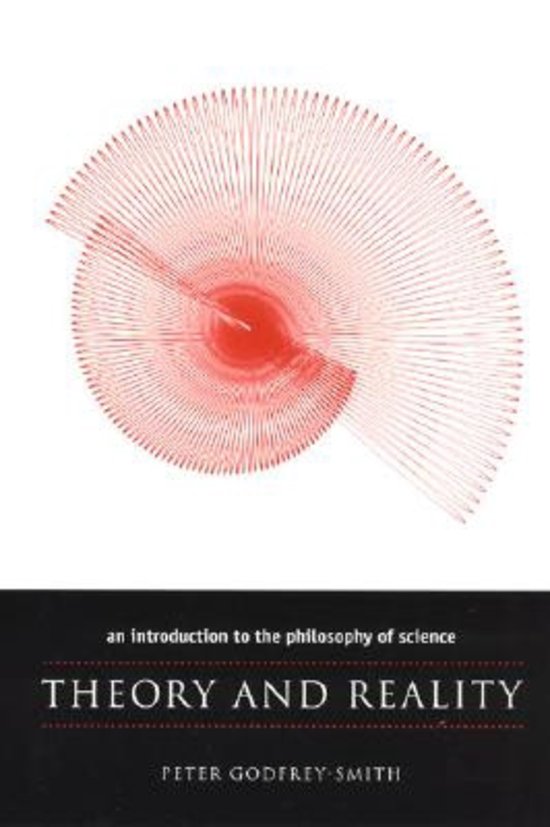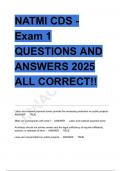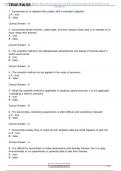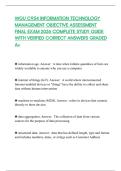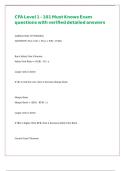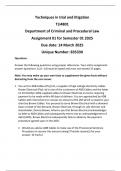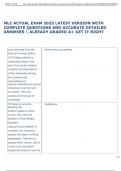Chapter 8|The challenge from Sociology of science .......................................................................................................................... 2
Robert Merton and the “Old” sociology of science ..................................................................................................................... 2
The rise of the strong program .................................................................................................................................................... 2
Leviathan and Latour.................................................................................................................................................................... 3
Chapter 9|Feminism and Science Studies .......................................................................................................................................... 5
The man of reason ........................................................................................................................................................................ 5
The case of primatology ............................................................................................................................................................... 5
Feminist Epistemology ................................................................................................................................................................. 5
Science studies, the Science wars, and the Sokal Hoax .............................................................................................................. 5
Chapter 10|Naturalistic philosophy in theory and practice ............................................................................................................... 7
What is naturalism? ..................................................................................................................................................................... 7
Quine, Dewey, and others ........................................................................................................................................................... 7
The theory-ladenness of observation .......................................................................................................................................... 7
Chapter 11|Naturalism and the Social structure of Science .............................................................................................................. 9
Science as a process ..................................................................................................................................................................... 9
Kitcher and the Division of Scientific labor.................................................................................................................................. 9
Social structure and Empiricism ................................................................................................................................................. 10
Chapter 12|Scientific Realism .......................................................................................................................................................... 11
Approaching Scientific Realism .................................................................................................................................................. 11
A statement of scientific realism ............................................................................................................................................... 11
Confidence ............................................................................................................................................................................. 11
Challenges from Traditional empiricism .................................................................................................................................... 12
Metaphysical Constructivism ..................................................................................................................................................... 12
Kant ........................................................................................................................................................................................ 12
Bad view ................................................................................................................................................................................. 13
Van Fraassen’s view (1980) ........................................................................................................................................................ 13
Models ........................................................................................................................................................................................ 13
Chapter 13|Explanation................................................................................................................................................................... 14
The rise and fall of the covering law theory of Explanation ..................................................................................................... 14
Problems ................................................................................................................................................................................ 14
Causation, Unification, and more .............................................................................................................................................. 15
Causation ............................................................................................................................................................................... 15
Unification .............................................................................................................................................................................. 15
Laws and causes ......................................................................................................................................................................... 16
Chapter 14|Bayesianism and Modern theories of evidence ............................................................................................................ 17
Understanding evidence with probability ................................................................................................................................. 17
1|Page
, The subjectivist interpretation of probability ........................................................................................................................... 17
Dutch book ............................................................................................................................................................................. 17
Scientific realism and Theories of evidence .............................................................................................................................. 18
Procedural Naturalism ............................................................................................................................................................... 19
Chapter 15|Empiricism, Naturalism, and scientific realism ............................................................................................................. 20
The apparent tensions ............................................................................................................................................................... 20
Empiricism reformed .................................................................................................................................................................. 20
Summary exam (part 2) Philosophy of Science
Since the first exam included a lot of questions about the centuries and names of books, I included them as detailed as possible
in this summary.
Chapter 8|The challenge from Sociology of science
Robert Merton and the “Old” sociology of science
The ‘sociology of science’ developed in the middle of the twentieth century (founder Robert Merton)
“Mertonian sociology of Science” is basically mainstream sociology applied to the structure of science
and to its historical development. “norms” of science are – a set of basic values that govern scientific
communities. These norms (part of Merton’s account of science) are universalism, communism,
disinterestedness, and organized skepticism.
Universalism à the idea that the personal attributes and social background of a person are irrelevant to
the scientific value of the person’s ideas.
Communism à the common ownership of scientific ideas and results. (Anyone can make use of any
scientific idea in his or her work)
Disinterestedness à scientists are supposed to act for the benefit of a common scientific enterprise,
rather than personal gain.
Organized skepticism à a community-wide pattern of challenging and testing ideas instead of taking
them on trust.
A later added idea: The account of the reward system in science. The basic currency for scientific reward
is recognition, especially for being the first person to come up with an idea. This is the only property
right recognized in science. This system functions mostly to encourage original thinking.
The importance of recognition is made evident by the fact that the history of science is crammed with
priority disputes.
The rise of the strong program
A way in which the old and the new work are often distinguished: The older work wanted to describe
the social structure and social placement of science as a whole but did not try to explain particular
scientific beliefs in sociological terms. The new approach has tried.
The newer sociology embraced Kuhn, holism about testing, incommensurability, new ideas about
observation, and various speculative views about scientific language.
Most famous project: The strong program in the sociology of scientific knowledge, developed by Barnes
and Bloor (1970s). The “symmetry principle” – all forms of belief and behavior should be approached
2|Page
,using the same kinds of explanations. Our own assessment of an idea should have no effect on how we
explain its history and social role. The principle tells us that scientific beliefs are products of the same
general kinds of forces as other kinds of belief. People of all kinds live in communities that have socially
established local norms for regulating belief – norms for supporting claims, for handling disagreement,
for working out who will be listened to and who will be ignored.
Scientists’ community à high prestige, lengthy training and initiation, notoriously bad fashion choices,
and expensive toys.
MacKenzie (1981) argued that the development of some of the most important ideas in modern
statistics should be understood in terms of the role these tools had. Eugenics is the attempt to influence
human evolution by encouraging some people to breed and discouraging others from doing so.
The strong program is also often associated with relativism à standards of rationality, evidence, and
justification. Relativism in this context holds that there is no single set of standards entitled to govern
the justification of beliefs. The norms and standards that govern scientific belief can be justified only
from the inside.
Leviathan and Latour
Two most famous works in recent sociology of science.
1. Steven Shapin and Simon Schaffer’s ‘Leviathan and the Air Pump’ (1985)
Discusses the rise of experimental science in seventeenth century England. This battle was not
“science versus religion”, but a battle over some specific scientific issues and over the proper
form for scientific work and argumentation. Boyle won. He wanted to distinguish the public,
cooperative investigation of experimental matters of fact from other kinds of work.
Boyle was not only setting up new ways of organizing work; he was also setting up new ways of
talking: new ways of asking and answering questions, handling objections, and reaching
agreement.
• Scientists are engaged in the manufacture of facts
• We need to get used to the idea that facts in general are made rather than found
Shapin and Schaffer took terms from Wittgenstein, who avoided formulating theories of
anything.
Two ideas that are popular:
“A form of life” is something like a set of basic practices, behaviors, and values. A form of life as
a whole cannot be justified externally.
Concept drawn from Wittgenstein; the “language game”
A language game is something like a pattern of linguistic habits that contribute to a form of life
and make sense within it.
• We should think of the socially maintained patterns of language use as all there is
to the “meaning” of language.
2. Latour and Woolgar’s ‘Laboratory Life’ (1979) à They discovered the chemical structure of
a hormone involved in the regulation of human growth. (Sometimes called the actor-
network theory)
3|Page
, They ignored the ways in which experimental methods in the field are able to discriminate
alternative chemical structures.
Latour saw this processing (that turned the mass of raw materials into the finished products) as
aimed at taking scientific claims and building structures of “support” around them, so they
would eventually be taken as facts. A key step in this process is hiding the human work involved
in turning something into a fact. To turn something into a fact is to make it look like it is not a
human product but is given by nature. Latour sees the scientific work itself as the driver.
We should never give the explanation (why one side succeeded and the other did not) in terms
of nature itself. When one side wins, that side’s version of “the facts” becomes immune to
challenge.
4|Page

